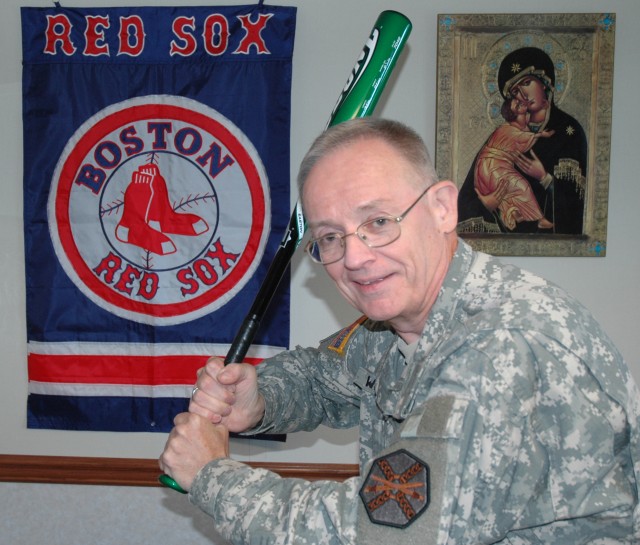FORT BELVOIR, Va. -- Chaplain (Col.) Alexander Webster is passionate about serving his country, as well as America's beloved pastime of baseball.
Besides being the installation's Eastern Orthodox chaplain for more than a year, Webster is a part-time instructor at nearby George Washington University. He's been a faculty member since 2002 and has many memorable stories from the classroom. Though, none may be greater than the thrill he's getting this semester.
For the first time since he's been at the school, Webster said he was granted approval to teach an honors class about baseball. It's called "Baseball in American History, Culture and Film" and it evaluates the sport's role in everything from social relations to its impact in cinema.
The class has six students and meets Monday and Wednesday evenings from 6 to 7:25 p.m. A long-time "pet project" for Webster, he had been thinking of a class like this for a while and suggested it to the university's director of humanities last year. The school then decided to incorporate the class into the curriculum this fall as a topical discussion for students.
"Many other colleges around the country teach classes on baseball and when I was given the thumbs up to do this class here, I can't tell you how excited I was," Webster said enthusiastically. "Indeed, it is a game. However, it's proven to be much more than that. Baseball has marked the time. It's shaped our nation's history, not just mirrored it."
When putting together a syllabus for the class, Webster said his main objective was to show how baseball interacts with American culture. To demonstrate his point, he selected 12 films, which he calls his "diamond dozen," that students review and later discuss. The list includes some all-time baseball heavyweights, such as "Pride of the Yankees" and "Field of Dreams" - a personal favorite of Webster's.
"Class participation is 25 percent of their grade, so it's very important to have a keen eye for the narrative flow and to use their analytical thinking when evaluating these films. I want students to carefully examine the themes being brought out in these movies, such as the father/son connection that's so evident in Field of Dreams," Webster continued.
"Even if they've seen the movie before, which is the case for some students, I tell them to look at it from all perspectives, including those they never considered before. I said the first day of class this is not going to be an easy A, and it's not."
As with all honors classes, Webster admits his class is also writing-intensive. Besides movie reviews, students analyze documents and write in-depth papers on two of the movies. Students are also required to read nine books throughout the semester. Not exactly an easy trip around the bases, but Webster believes the joy is still there. After all, it's about baseball. And that means having fun.
Last month, Webster and his students traveled to Nationals Park for a game between the Florida Marlins and Washington Nationals. As an added bonus, the group was invited upstairs before the game for a visit with Nationals radio play-by-play announcer Dave Jageler. After that, it was on to the television side of things with Bob Carpenter and former major league pitcher turned color commentator Rob Dibble.
"They were very kind and made our experience all the more pleasing.
Honestly, the announcers were just as fascinated with the students as they were with them," Webster said with a smile. "We've also had coaches from the university's baseball and softball teams come by. I believe guest speakers enhance the diversity of the class and make things more interesting. I hope to get some more before the semester is over."
As a diehard Boston Red Sox fan, Webster hopes that means a visit from one of his favorite players from years ago, former Red Sox pitcher Bill "Spaceman" Lee. While he's made contact with Lee about a possible visit to the university, nothing has been confirmed.
Win or lose, Webster is grateful for the opportunity to teach his class and would like to see it added again next year - this time as a lecture course where it would be open to many more students.
"If you examine history you'll see that baseball has been way ahead of the times. It was the first American institution to desegregate when Jackie Robinson was allowed to play professionally in 1947. Everything else followed," Webster said. "The armed forces desegregated a year later in 1948. Schools followed in 1954 and the civil rights amendment came a decade after that. Baseball has secured its place in history and I can't even imagine a society without it. This class has been incredible. I think the students are having just as much fun as I am."


Social Sharing